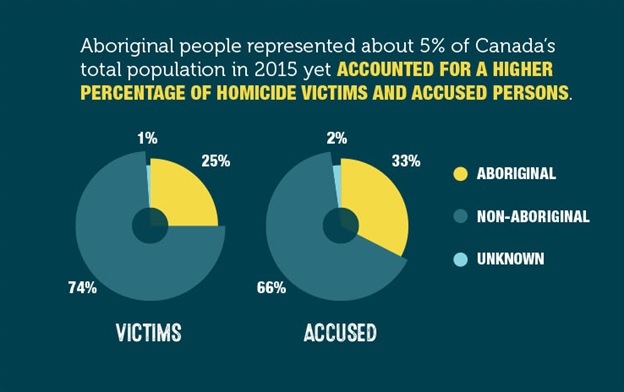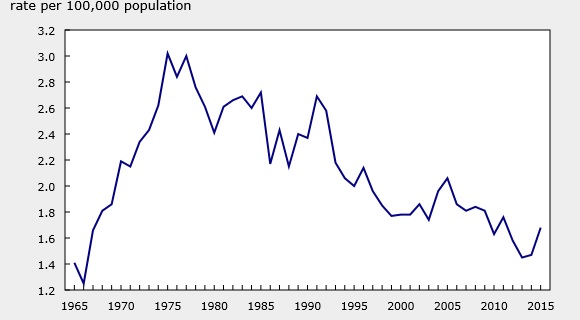Smart on Crime Blog
Posted on: January 16th, 2017 by Waterloo Region Crime Prevention Council
Homicide rates rose in 2015 in Canada, Ontario, and Kitchener-Cambridge-Waterloo census metropolitan area (CMA).[1] It will remain to be seen over the next few years whether this represents a notable change or simply reflhttp://ftn#1ects year-to-year variations in rates. Nonetheless, homicide rates in both Ontario and the Kitchener-Cambridge-Waterloo CMA continue to be below the national average, and Canada’s homicide rate has been dropping overall since 1975. What we do see is that homicide continues to impact some groups more than others, including Aboriginals, males, and those living in the Prairie Provinces.
The homicide rate in Canada rose in 2015 by 15%, reaching its highest levels since 2011. In 2014, there were 521 homicides, while in 2015, there were 604, increasing the homicide rate per 100,000 Canadians from 1.47 to 1.68.[2], which is still 2% lower than the average rate for the ten-year period between 2005 and 2014.[3]
Ontario also saw an increase in the homicide rate from 1.14 to 1.26. The Kitchener-Cambridge-Waterloo CMA also saw an increase in homicides from 3 to 6, with a corresponding increase in the homicide rate from 0.56 to 1.11, but these numbers are more variable because of the lower number of homicides.
Homicides in Canada, 1964-2015:
What has changed
2015 saw increases in homicide both involving firearms and involving gang violence. In Canada in 2014, 155 homicides were committed with a firearm, compared to 178 in 2015, an increase of 15%, and the highest number since 2008. Gang-related homicides also increased from 82 in 2014 to 98 in 2015, an increase of 20%, and the highest number of gang-related homicides since 2011.
The number of homicides increased primarily in three provinces: Ontario, which had 18 more homicides for a local increase of 23%; Alberta, which had 27 more homicides for a local increase of 25%; and Saskatchewan, which had 19 more homicides for an increase of 79%.
However, not all changes in homicide rates were increases.
- Homicides by strangers dropped by 21% from 73 to 58 between 2014 and 2015. Conversely, 87% of victims knew those accused of their homicides.
- Intimate-partner homicides remained relatively stable, with 83 such homicides in 2015 compared with 80 such homicides in 2014.
Continuing Patterns
Homicide continues to affect certain portions of the population and certain parts of Canada more than others.
- Homicide continues to disproportionately involve Aboriginal Canadians, with 25% of homicide victims and 33% of those accused of homicide being Aboriginal, though Aboriginals make up only 5% of the population.
Homicides among Aboriginal people in Canada:
- Males continue to be over-represented when it comes to homicide, accounting for 71% of homicide victims and 88% of those accused of homicide.
- Homicide continues to be overly prominent in the Prairie Provinces, for all of which homicide rates are now over 3 per 100,000, with Saskatchewan’s and Manitoba’s rates being more than double the national average.
Putting It All Together
Homicide provides a significant cost to Canadian society. According to a research report by Public Safety Canada, each homicide costs Canadians between $4.8 and $5.9 million.[4] These costs, along with the human costs of homicide, provide important incentives for monitoring and reducing the number of homicides in Canada.
Though homicide rates increased between 2014, it is difficult to say what this means. There have been similar spikes before, such as in 2011, when the rate spiked by 8% only to drop by over 10% the next year. Ontario witnessed a similar spike and drop between 2005 and 2006. In regard to the Kitchener-Cambridge-Waterloo CMA, because there are so few homicides, the homicide rate is likely to vary from year to year, with 8 homicides in 2013, then 3 in 2014 and 6 in 2015. It would take several years of higher rates before any continuing pattern could be identified. Nonetheless, the homicide rate in Ontario of 1.26 per 100,000 remains below the national average of 1.68, as does the homicide rate in the Kitchener-Cambridge-Waterloo CMA at 1.11 per 100,000. Overall, homicide has been on a decline since a national high of 3.02 in 1975. What we do see is that homicide continues to impact some groups and areas more than others, including Aboriginals, men, and the Prairie Provinces.
[1] The Kitchener-Cambridge-Waterloo census metropolitan is the Region of Waterloo excluding the Township of Wellesley and the Township of Wilmot
[2] Unless otherwise noted, all statistics are derived from Mulligan, L., Axford, M., and Solecki, A. (2016). Homicide in Canada: 2015. Ottawa: Statistics Canada. Retrieved on January 16, 2017 from http://www.statcan.gc.ca/pub/85-002-x/2016001/article/14668-eng.pdf.
[3] Statistics Canada. (2016). Homicide in Canada: 2015 [fact sheet]. Ottawa: Statistics Canada. Retrieved on January 25, 2017 from http://www.statcan.gc.ca/pub/11-627-m/11-627-m2016008-eng.htm.
[4] Gabor, T. (2015). Costs of Crime and Criminal Justice Responses. Public Safety Canada. Retrieved on January 16, 2017 from http://www.statcan.gc.ca/pub/85-002-x/2016001/article/14668-eng.pdf, p. 6.
Author: Daniel is an MSW student with the Waterloo Region Crime Prevention Council working on various research projects and community engagement initiatives. Daniel holds a doctorate in philosophy from the University of Toronto, where he taught for six years. He now runs a mediation and psychotherapy practice in downtown Kitchener while completing a master of social work degree at Wilfrid Laurier University.
Posted on: November 23rd, 2016 by Waterloo Region Crime Prevention Council
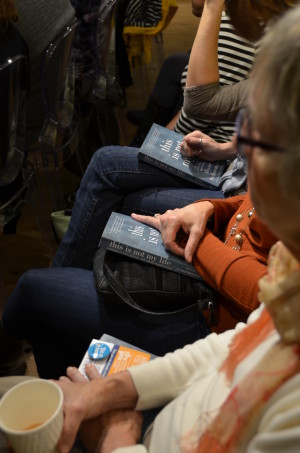 All of the calls to action already mentioned in the previous blog posts (humanizing people in prison & advocating for programs that work) help to create and strengthen system change in big and small ways. The work of larger structural change is long term, often slow work: Not for the faint of heart, but everyone can still play a role.
All of the calls to action already mentioned in the previous blog posts (humanizing people in prison & advocating for programs that work) help to create and strengthen system change in big and small ways. The work of larger structural change is long term, often slow work: Not for the faint of heart, but everyone can still play a role.
Here are a few ways you or your friends can contribute toward society and system changes.
- Male Allies Against Sexual Violence – Through public education, the Male Allies program invites men and boys to be leaders in the work of ending gender-based violence. Their goal is to encourage critical introspection in men and boys, which begins by helping them to understand gender-based violence as a men’s issue. Over the past eight years, they have offered hundreds of workshops to thousands of men and boys and have just started a ground-breaking training initiative with the Ontario Hockey League.
- Learn more about the root causes of crime. In order to prevent something, it’s important to understand the contributing factors. As a community, we have the responsibility to address these conditions which hinder healthy development and can lead to criminal behaviour.
- Learn more about Smart on Crime approaches to addressing crime. Everyone has heard about tough on crime, but what about Smart on Crime? As a community, we can use language that shows we can build a community that is safe and vibrant for all people living in Waterloo Region.
- Follow the advocacy work of Howard Sapers – Until recently, Howard Sapers was the Correctional Investigator of Canada responsible for the investigation of individual and systemic concerns. He was also a guest for a 2015 Friends of Crime Prevention event. On November 8, the Ontario Government appointed Mr. Sapers to be an independent advisor on corrections reform and to provide advice to the government on the use of segregation and ways to improve the province’s adult corrections system.
When we have people and community organizations working at all three areas of action to humanize people in prison and reduce stigma for loved ones, advocate for programs that work and enter into deeper levels of system and societal change, we can move the needle on progressive change.
If you decide to take some action, we would love to hear about it – 6 weeks from now, or 6 months from now! Get in touch with Juanita Metzger to share your story.
Posted on: November 23rd, 2016 by Waterloo Region Crime Prevention Council
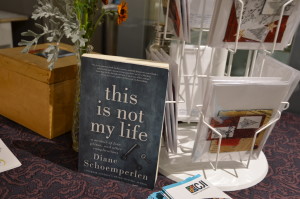 Inevitably, the Turn the Page book club discussions turned to the support provided to people in prison while they serve their sentences and the programs and support available during parole or upon release. Many people in attendance admitted to not knowing the reality facing people on the ‘inside’.
Inevitably, the Turn the Page book club discussions turned to the support provided to people in prison while they serve their sentences and the programs and support available during parole or upon release. Many people in attendance admitted to not knowing the reality facing people on the ‘inside’.
The past 5-7 years have seen a cut in federal funding to several prison support programs (inside and outside prisons) that have shown to be effective in reducing recidivism, building skills for reintegration and providing support to some of the most stigmatized prisoners, people who have sexually offended.
You might be interested in supporting these programs with a donation to keep them going. Or, as someone suggested at the book club event, you might want to write a letter to your Member of Parliament advocating for increased funding to support these valuable programs.
- Lifeline provides support and transitional housing to men who have served a life sentence as they prepare for reintegration into our communities. Funding for this program was cut in 2012/2013. Some Lifeline programs are still offered through various St. Leonard Society organizations.
- Circles of Support and Accountability is a Canadian-made restorative justice program for men and women who have committed serious sexual offences. CoSA allows the community to play a direct role in the restoration, reintegration, and risk management of people who are often seen with only fear and anger. COSA experienced the same severe federal funding cuts as Lifeline in 2014 and has spent a great deal of time figuring out how to support a nation-wide program of COSA chapters. They have even some sample letters already prepared which you could use to advocate for reinstated funding for COSA.
- Prison farms have been a part of 6 federal prison institutions since the establishment of correctional facilities in Canada. They were defunded and closed by the federal government between 2009 – 2013. Prison farms provided beneficial employability and training opportunities, time management and responsibility skills, animal therapy, productive labour and physical exercise, access to nature, individual and team building work, and training in farm management and operation. There are many advocating for the return of prison farms as a prosocial training opportunity for inmates. Project Soil published an excellent case study of the prison farms at Frontenac and Pittsburgh Institutions, both Correctional Services of Canada facilities in Ontario.
- Here is a 59 minute film about prison farms in Canada – Til the Cows Come Home.
If you’re super keen, someone suggested having a letter writing party – invite your friends, invite your neighbours!
There are certainly more prisoner support programs that are proven to work, but these three were discussion specifically at the event.
Also check out the call to action for opportunities to be involved in systems and societal changes.
Posted on: November 23rd, 2016 by Waterloo Region Crime Prevention Council
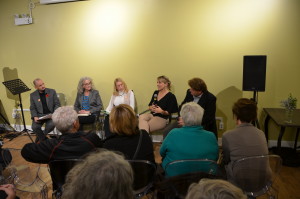 The Turn the Page book club stimulated a great deal of discussion about the stigma. Society, in general, has a negative stigma against people that have been in prison and often their family member and children too.
The Turn the Page book club stimulated a great deal of discussion about the stigma. Society, in general, has a negative stigma against people that have been in prison and often their family member and children too.
People began to ask questions: How do we change this attitude in society and within ourselves? Given that we have a federal prison for women right here in Waterloo Region, how can we help within our own community? How can we get involved?
We’ve pulled together a range of potential ‘calls to action’ that help to humanize people in prison & reduce the stigma of loved ones. As Diane and the panelists reminded us, people in prison will leave prison when their sentences end and return to our communities. Reintegration to life on the ‘outside’ doesn’t happen by magic.
There are countless ways to be involved, likely more than we have to share, but here’s a start.
To start.. Read the Book! If you didn’t get a chance the first time around, it’s still available to borrow at KPL, WPL and Cambridge or get it for sale at Wordsworth Books in Waterloo. We developed a reading guide that might be helpful for checking some of your assumptions and thinking broadly about this issues Diane challenges us with.
If you have a book club, get them to read the book too! We’ve even created a handy Reading Guide to accompany the book.
One of the best ways to start in this area is to work directly with or support the organizations that work with inmates and their families.
- STRIDE is a program of Community Justice Initiatives. STRIDE helps women in prison build informal networks of support that assist them as they reintegrate back to the community. They also prepare the community to receive them safely and supportively. CJI has several other programs that offer support to offenders.
- John Howard Society Waterloo-Wellington offers diverse prevention, diversion, intervention and educational services for children, youth and adults who are in conflict with the law or at risk of getting there.
- Elizabeth Fry Society for Kitchener Waterloo provides gender-specific services, support and advocacy for women within the community, involved in a judicial process or who are serving sentences at Grand Valley Institution for Women, a federal prison for women located in Kitchener.
- Volunteer at Grand Valley Institution – The Correctional Service of Canada has a volunteer program that works directly with recreational activities, classroom and workshop instruction, and cultural or chaplaincy activities and supports families of offenders or helping released offenders re-adjust to life.
These are all very different volunteer opportunities and if you are very interested, best to do the research and find the best fit for you and your interests. You might discover that you prefer a community based approach rather than a formal institutional setting.
Check out the ‘calls to action’ related to advocating for programs that work and creating system change.
Posted on: November 23rd, 2016 by Waterloo Region Crime Prevention Council
 At first glance, Diane Schoemperlen’s memoir “This Is Not My Life: A Memoir of Love, Prison, and Other Complications” seems straight forward, in its own way, the stuff of TV shows and movies…. An author meets a fellow volunteer at a Kingston soup kitchen whom she knows has been is in prison, they become friends, they eventually develop an intimate partner relationship, they try to navigate the world inside prison and outside prison, they try to manage life together on the outside, the author leaves the relationship that has become abusive and spends the next six years healing and putting her life back together.
At first glance, Diane Schoemperlen’s memoir “This Is Not My Life: A Memoir of Love, Prison, and Other Complications” seems straight forward, in its own way, the stuff of TV shows and movies…. An author meets a fellow volunteer at a Kingston soup kitchen whom she knows has been is in prison, they become friends, they eventually develop an intimate partner relationship, they try to navigate the world inside prison and outside prison, they try to manage life together on the outside, the author leaves the relationship that has become abusive and spends the next six years healing and putting her life back together.
After spending an evening with Diane at the Turn the Page Book Club hosted by the Friends of Crime Prevention we have a deeper understanding of the complexity of this story. The story of their relationship covers tough issues tied to root causes of crime, such as family violence, sexual violence, and problematic substance use. Schoemperlen is unflinching in assessing her own motivations for staying in the relationship, as she comes to know the shadow and stigma that institutionalization casts over inmates and their loved ones.
Maybe slightly unorthodox for your average book club, Friends also brought together a community panel of Jennifer Hutton (Women’s Crisis Services of Waterloo Region), Chris Cowie (Community Justice Initiatives) and Shannon Moroney, author of Through the Glass to discuss the themes of the book in more depth and draw some direct applications to our community.
From the discussions between Diane & the panelist and the question/answer period with the community readers, we covered more content and topics than your average university course! Discussion ranged from childhood abuse/trauma to incarceration rates, from restorative justice to the lack of helpful prison programs, from reintegration challenges for released inmates to stigma faced by loved ones and family members of inmates, from abusive relationships to support networks for families of inmates, from the prison industrial complex to… well, I think you get the idea. Diane’s is a personal story that shines a light, not only on her own experience, but deftly directs a laser beam at the prison system in Canada. Diane skillfully tells a political story through her own story – a story that concerns us all.
Over the course of the discussion, people began to ask questions: What we can do to change a system that is clearly not working? Given that we have a federal prison for women right here in Waterloo Region, how can we help within our own community? How can we get involved?
We’ve pulled together a range of potential ‘calls to action’ and avenues for participating in creating change. Clicking on the links here will get you started.
If you decide to take some action, we would love to hear about it! Get in touch with Juanita Metzger to share your story.
Posted on: November 16th, 2016 by Waterloo Region Crime Prevention Council
When you host a public book club, you just never know how things will unfold, much less when you host one with the title “Prisons, Justice and Love”! But we couldn’t have had a more engaging night if we had tried!
Friends of Crime Prevention were pleased to host the first ever “Turn the Page” Book Club with Diane Schoemperlen in November 2016. Scroll through the photos below for a short photo essay of the evening together with community partners, neighbours and Friends.
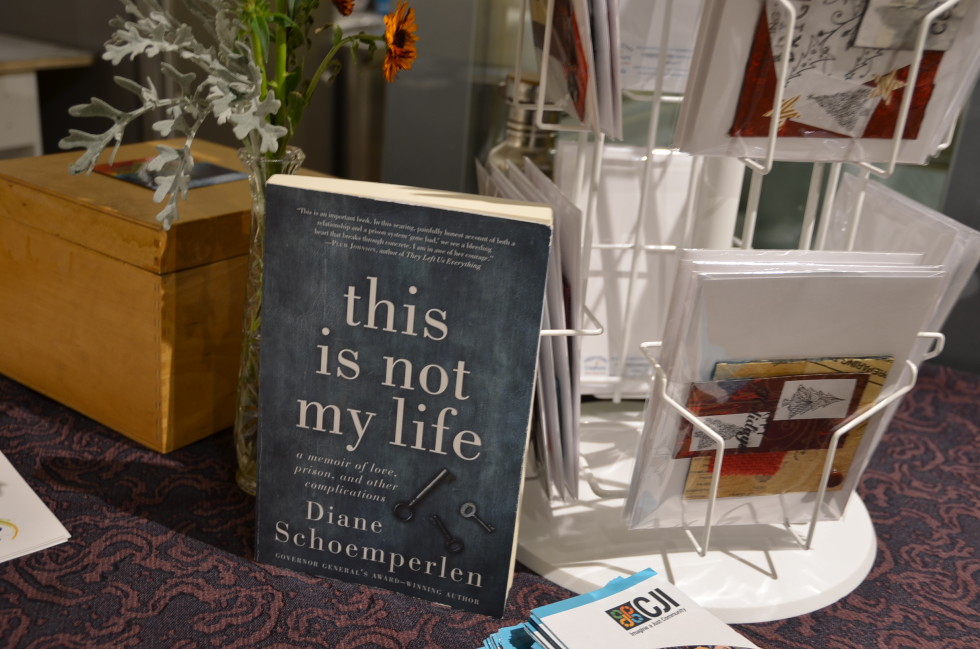
This is not my life by Diane Schoemperlen – our first book club selection for the Turn the Page Book Club focused on prisons, justice and love. A very entangled combination!
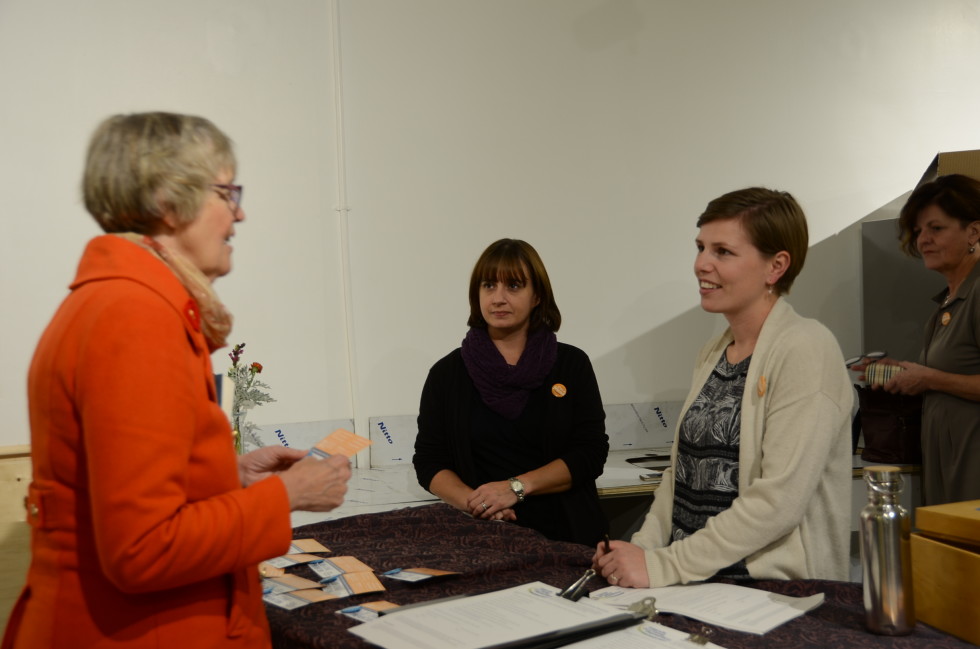
Friends of Crime Prevention, Jenn Robinson (middle) and Lisa Armstrong (right) were the most friendly greeters! Great to see so many new faces.
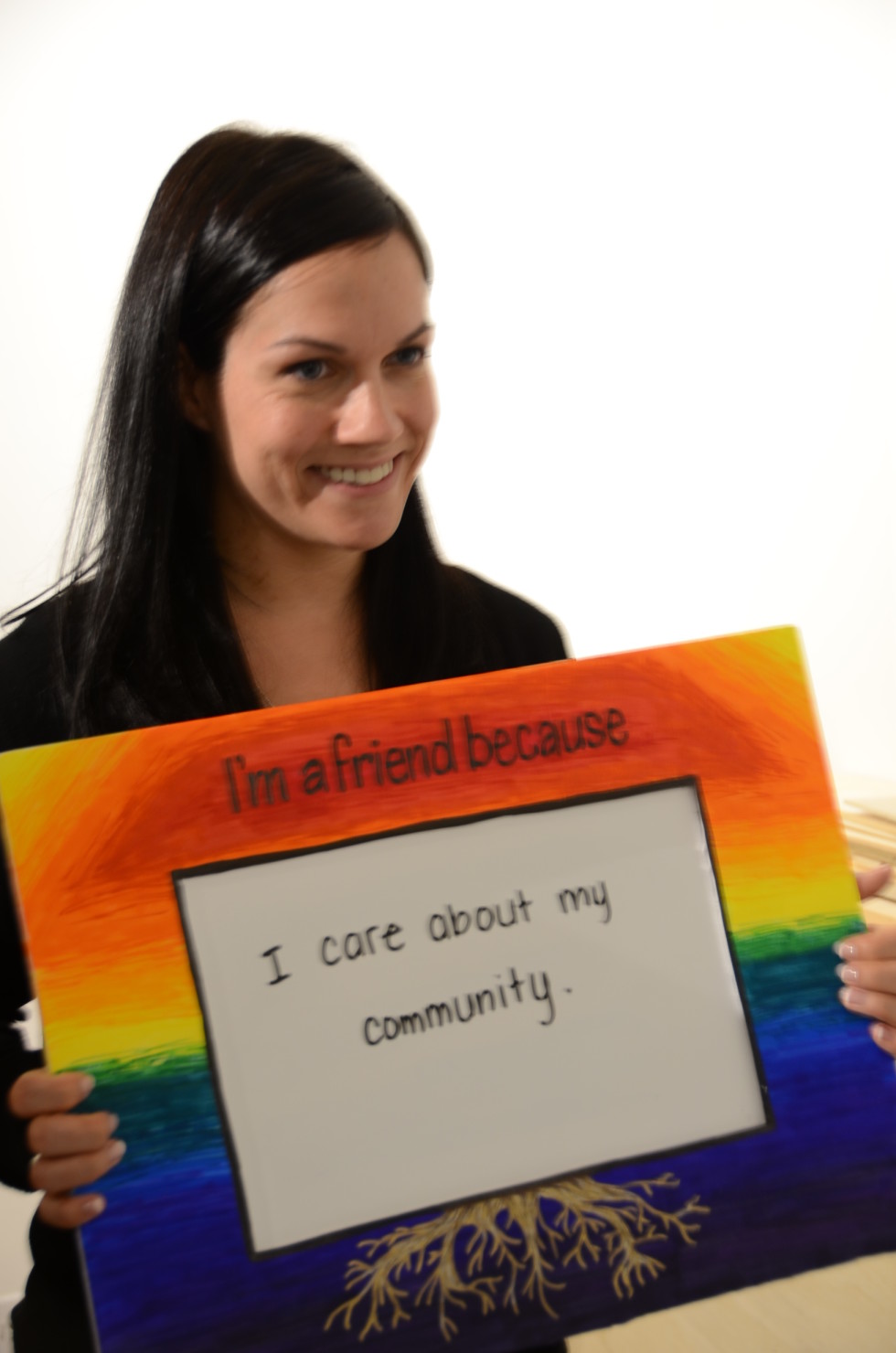
As people gathered for the evening, Friends of Crime Prevention had the opportunity to let us know why they are a Friend. Jeanean Thomas – because I care about my community
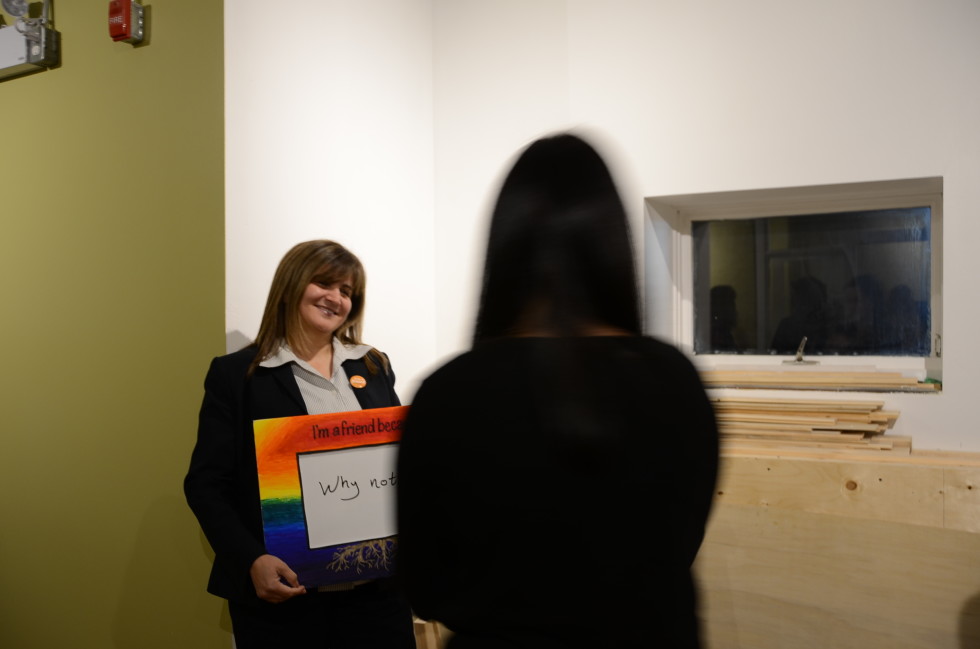
As people gathered for the evening, Friends of Crime Prevention had the opportunity to let us know why they are a Friend.
Pari Karem – Why not?!
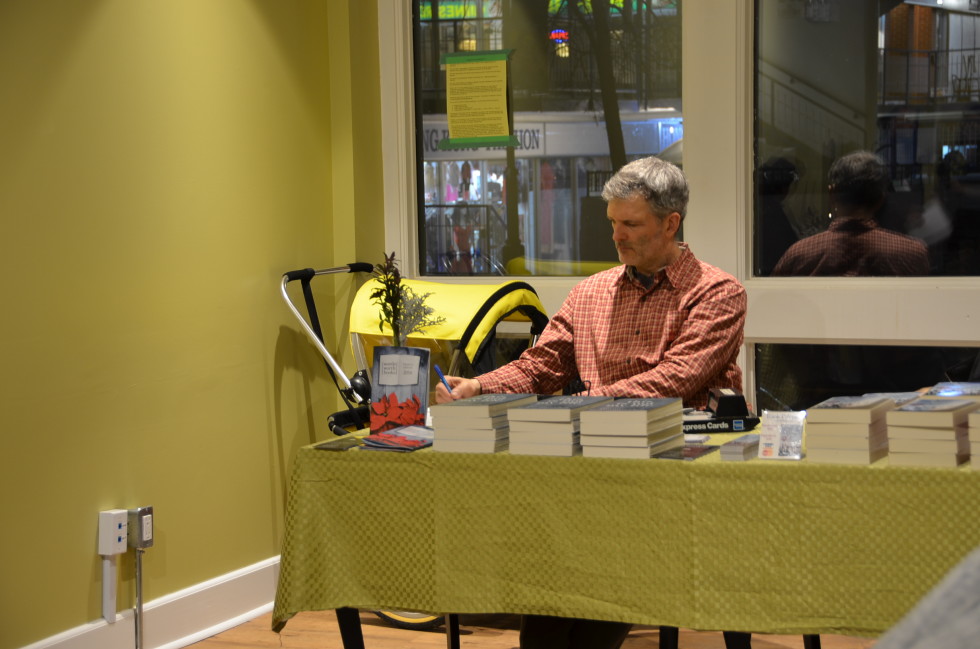
Thanks to John and Wordsworth Books for bringing extra copies of Diane’s book for sale!
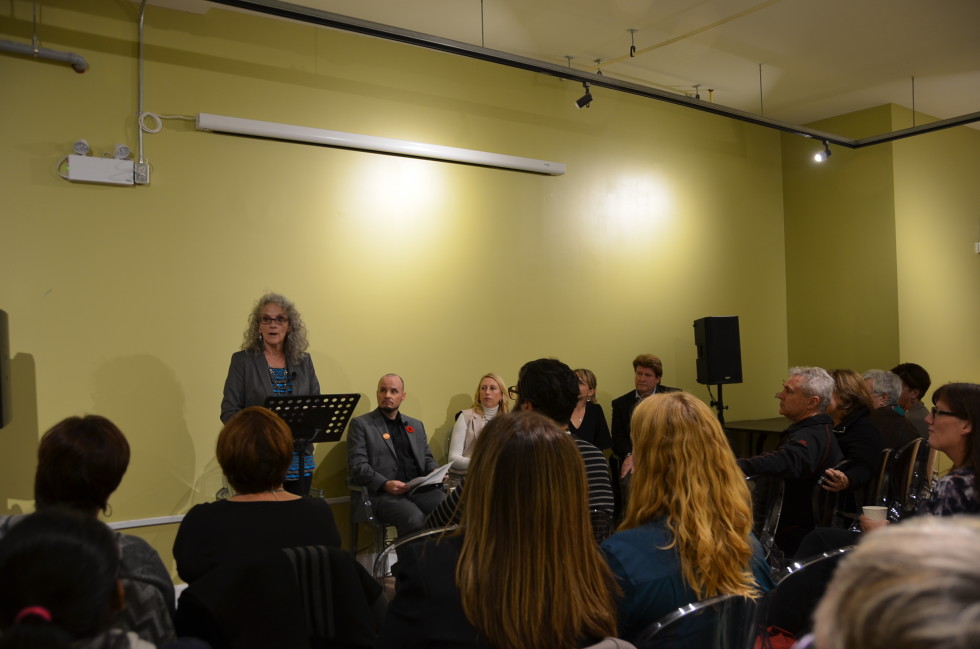
The inaugural Turn the Page Book Club was held at Fresh Ground, a new cafe & community space developed by The Working Centre.
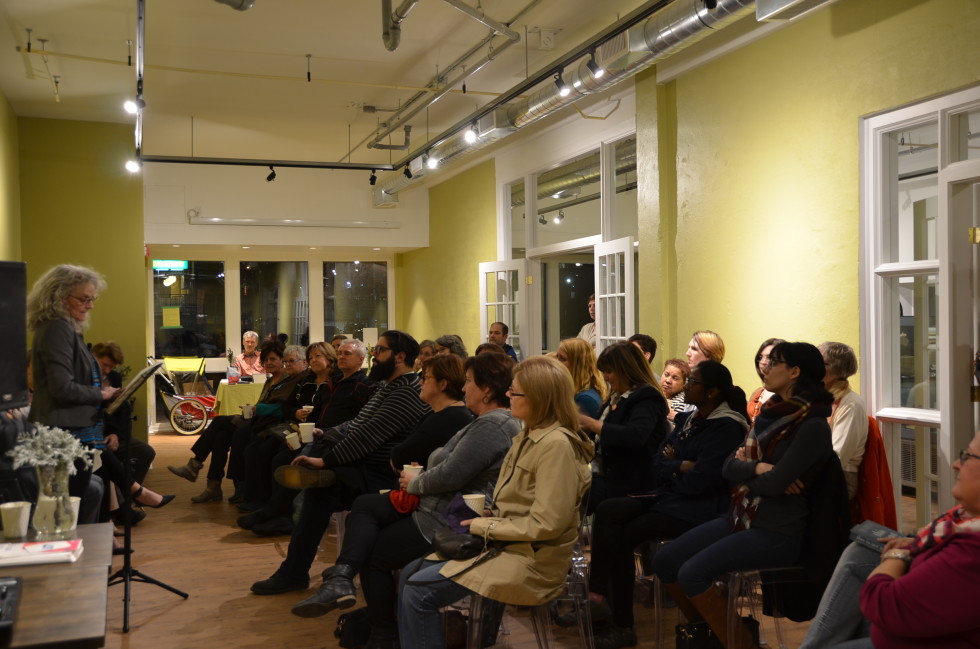
48 people gather to hear Diane read from her new book “This is Not My Life: A Memoir of Love, Prison, and other Complications.
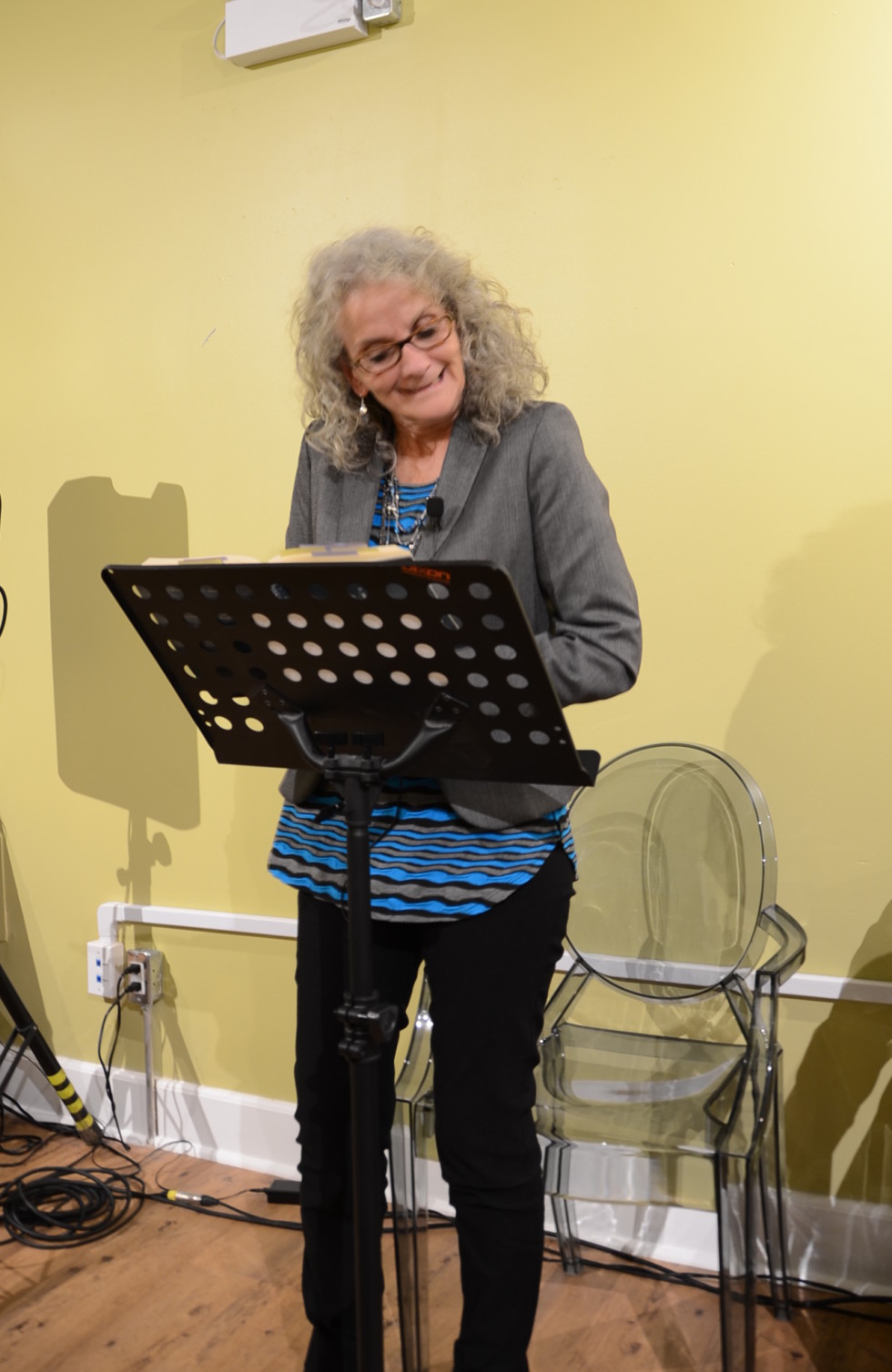
Diane reads the first line of the her book, a first line she is quite proud of! You’ll have to read the book to find out why this line still makes her laugh! Or listen to her interview with The Current on CBC Radio where the host reads it out loud.
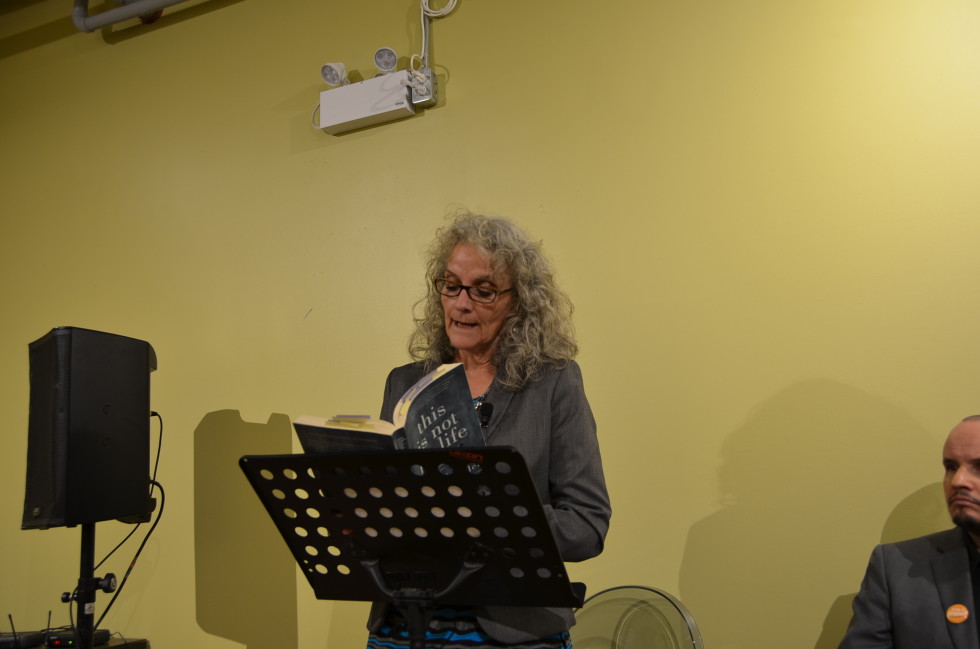
Diane reading some of the more emotionally challenging parts from her book.
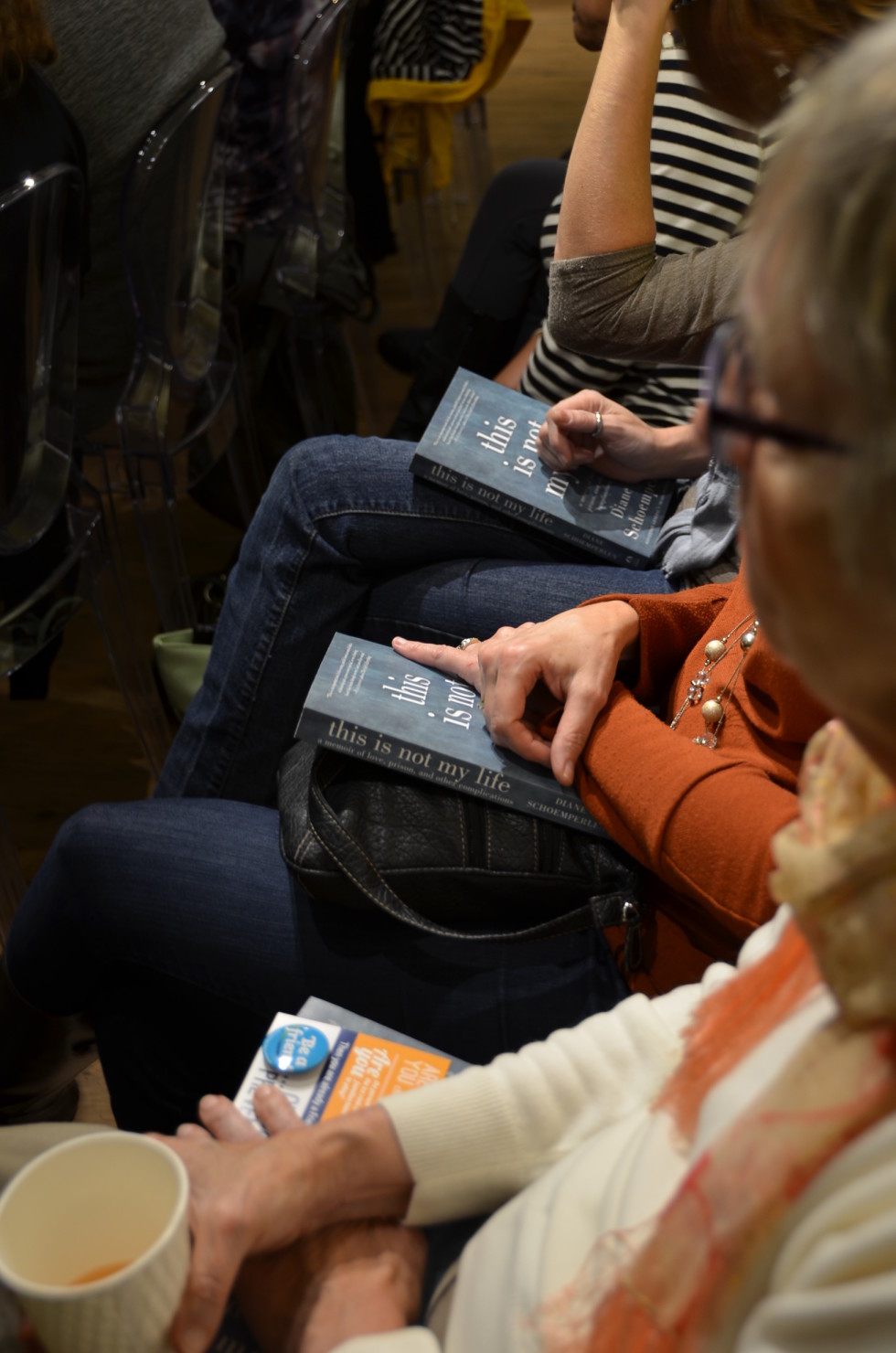
People came prepared! Many had read the book and had very insightful questions. Others came because of the topic, but bought the book by the end of the night!
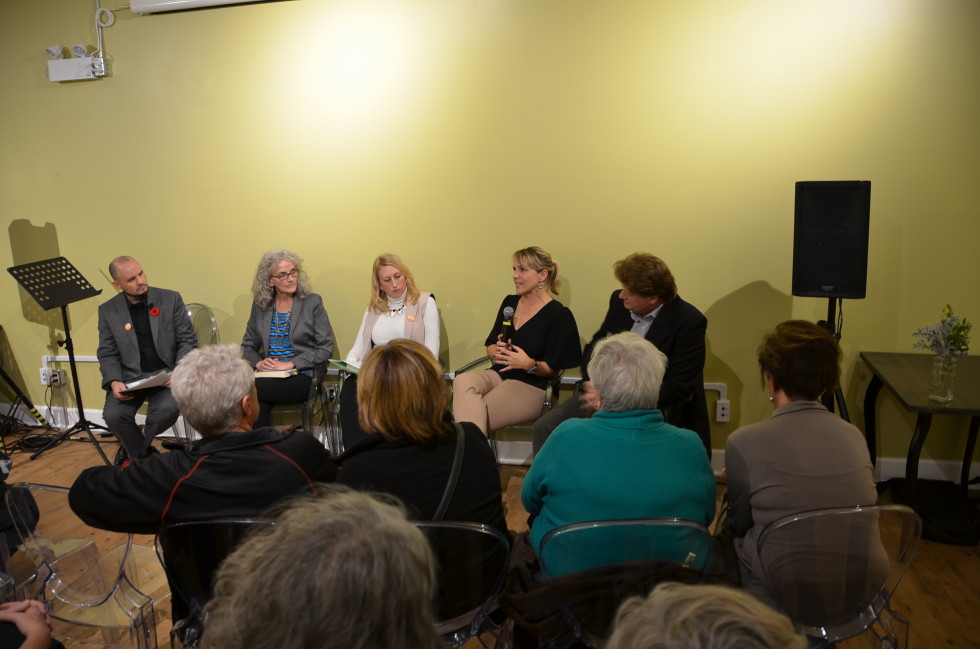
In addition to a talk and reading by Diane, we invited additional panel members from the community & beyond to complement the discussion of prisons, justice, stigma and relationships. From left: Mike Farwell, Moderator; Diane Schoemperlen, Author; Jen Hutton, Women’s Crisis Services Waterloo Region, Shannon Moroney, Author of Through the Glass; Chris Cowie, ED Community Justice Initiatives
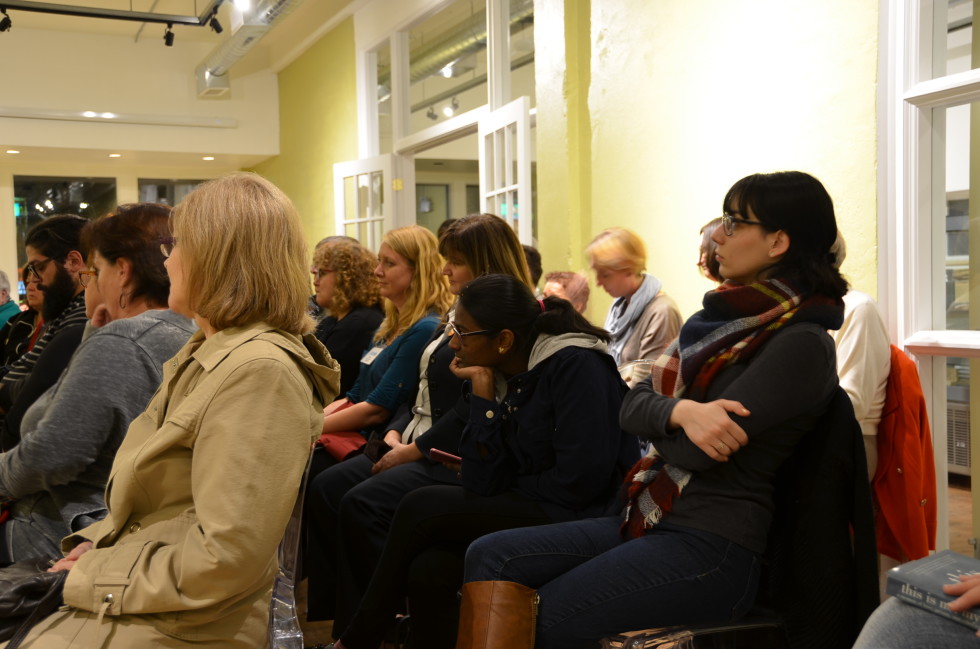
A very intent and listening audience!
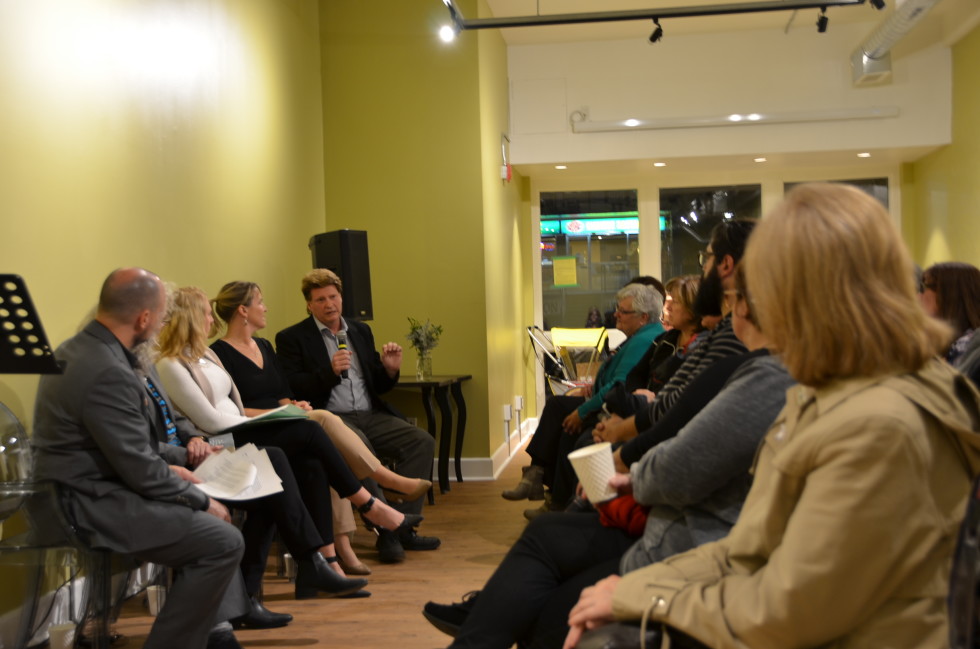
Chris Cowie from Community Justice Initiatives shared about the agency’s Restorative Justice mandate and how a more restorative process in prisons could help in countless ways i.e. better integration into society upon release, deeper understanding of the nature of offending, development of new skills to deal with conflict. Teaching and using restorative justice early can also be a prevention tool.
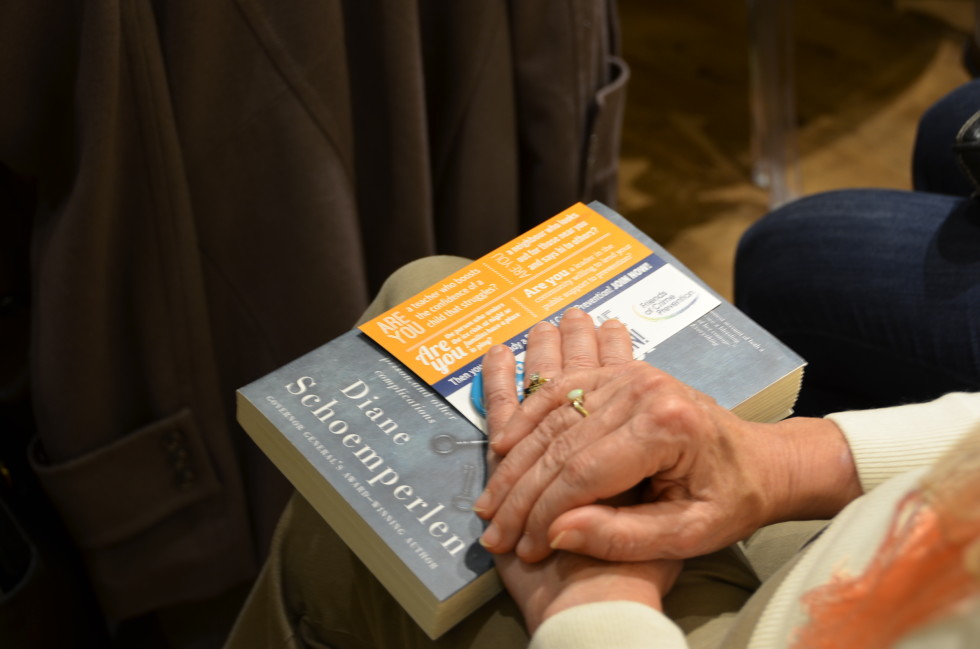
With all the new faces in the audience, it was a great opportunity for many to learn about w hat it means to be a Friend of Crime Prevention!

It only take a few minutes to become a Friend of Crime Prevention – just like Jen Hutton!
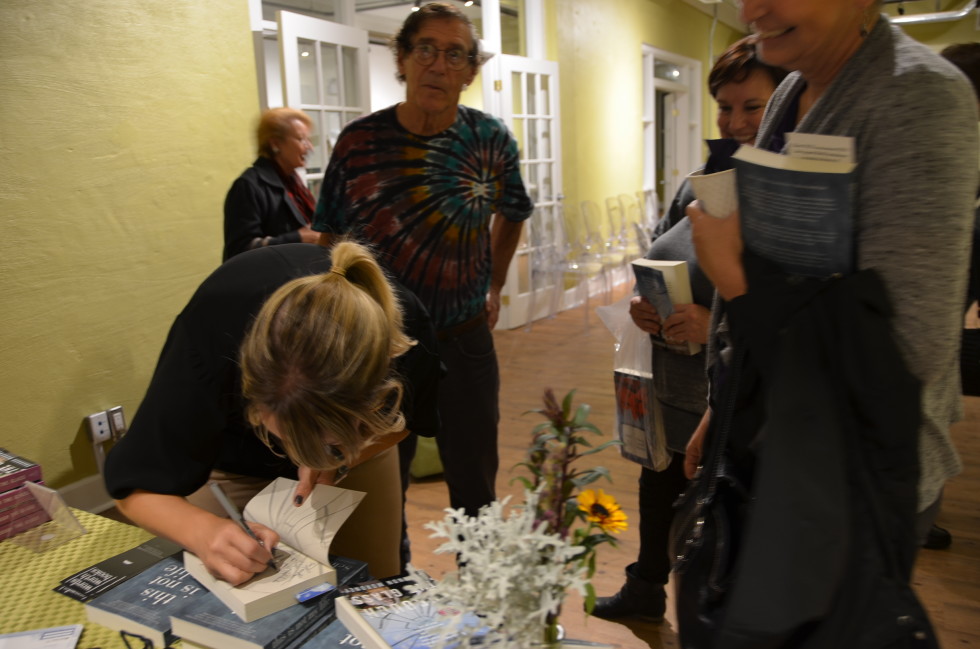
Both Diane and Shannon took time to sign books for anyone who wanted. Also a chance for great conversations.
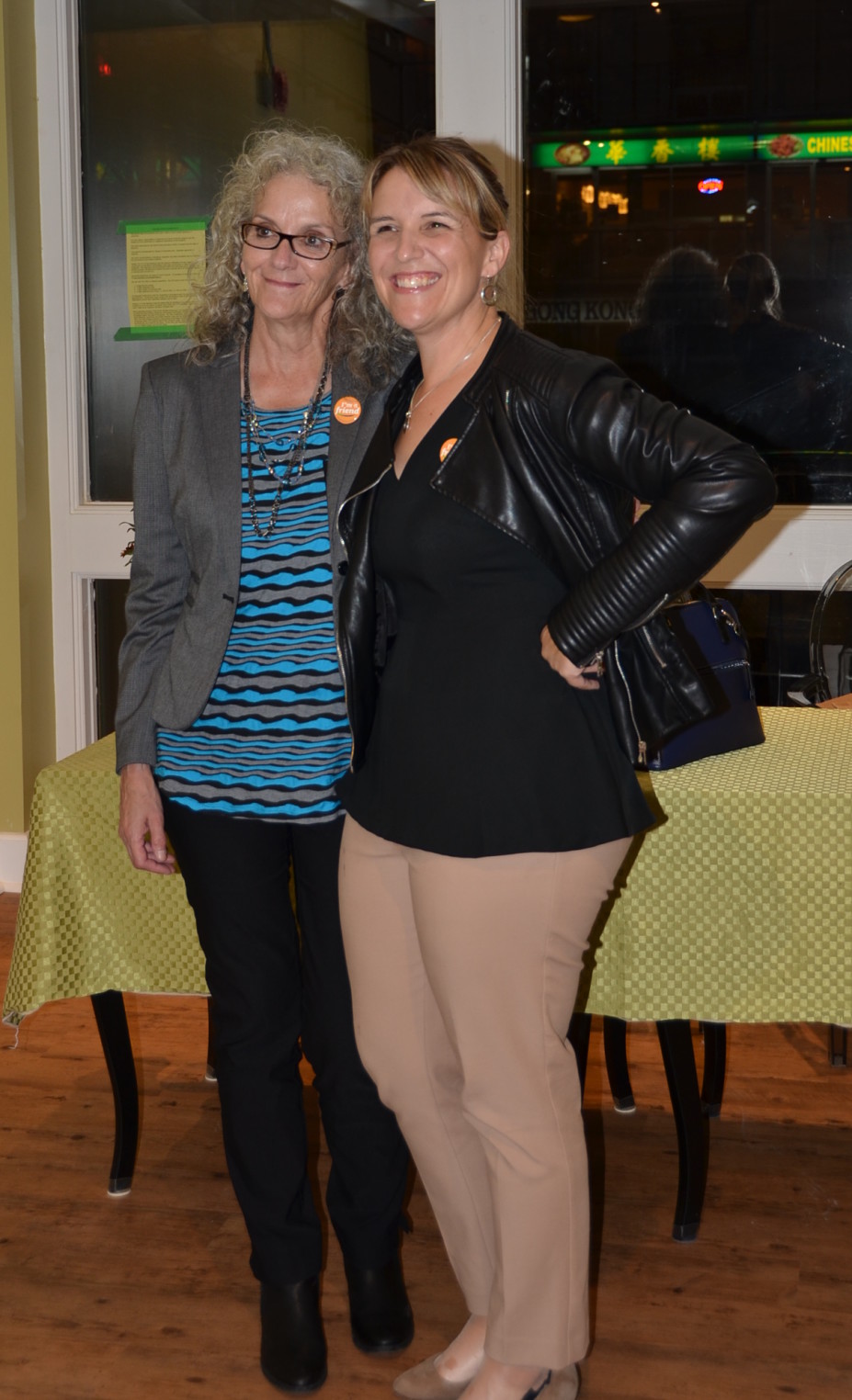
Diane and Shannon proudly display their “I am a Friend” buttons. Diane and Shannon were made honorary Friends and join Howard Sapers and Sir Neville, a guide dog, as Honorary Friends of Crime Prevention.
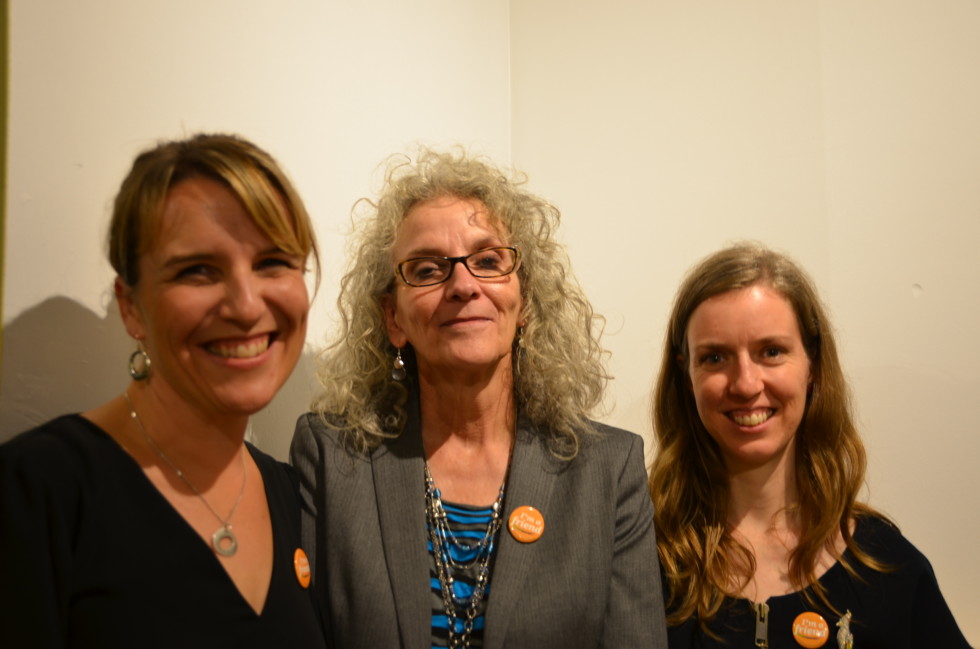
It was very special to have Shannon and Dianne together in the same evening. Shannon acted as a mentor to Diane during the writing of This is Not My Life. Shannon wrote her book Through the Glass about the life upheaval after husband confessed to the sexual assault and kidnapping of two women. Both Diane and Shannon have rich stories from which our community can learn so much! Diane and Shannon are pictured with Sarah Anderson, event organizer and facilitator from the Crime Prevention Council.
Posted on: October 17th, 2016 by Waterloo Region Crime Prevention Council
On November 3, Mike Farwell will join us for Prisons, Justice & Love – an evening with Diane Schoemperlen. And you’re invited too! It’s all part of the Friends of Crime Prevention Turn the Page Book Club, a community reading project to get people thinking and talking about stigma and justice. To get us ready for the community conversation about Diane Schoemperlen’s book This Is Not My Life on November 3, we asked Mike to read the book and share his thoughts.
Reflections by Mike Farwell
There are a variety of compelling reasons to pick up Diane Schoemperlen’s book ‘This Is Not My Life,’ not the least of which would be intrigue at the story of a woman who falls in love with a man who is in jail.
But at the first mention of the word “institutionalized” I was no longer able to focus on the salacious details of this love affair. Instead, I became focused on our prison system and wondered if we needed to redefine its purpose.
Many years ago, I visited Maplehurst Detention Centre, a medium security facility in Milton. The prison is organized into “pods,” with each pod containing 16 cells. You can look into these pods (it really is very much like the zoo or some other attraction designed for our amusement) through a clear yet strong bank of plexi-glass windows and see a common area with concrete tables and some benches along the walls.
The 16 cells are organized eight to a row, with one upper level and another at the ground.
It just so happened that while I was on tour, an inmate was being processed. With a great deal of procedure, and right on cue, the door to the pod was opened and the inmate was ushered inside by a guard.
And then he was greeted like the character Norm from the TV sitcom ‘Cheers.’
His fellow inmates seemed genuinely happy to see him, patting him on the back and calling to him by name. This, to me, is what being “institutionalized” means, and it’s all I could think about after the first appearance of the word in Schoemperlen’s book.
I get the sense that for these men, life “inside” is their normal. When someone returns to their pod, there’s no concern about what crime may have been committed that brought him back into their group. There’s only what passes for the return to normal, a return to a familiar way of life.
Schoemperlen’s love interest, Shane, was institutionalized and had little chance at life outside prison after spending decades within the system. This was immediately evident in the descriptions of the prisons themselves, the rules and procedures within the prisons, the elimination of programs aimed at teaching skills and offering meaningful daily work to inmates, and the complicated parole system on the outside, with its complete lack of understanding of what trying to adapt to an entirely new life is like.
Given the benefit of an objective viewpoint and some experience with our prison system, it quickly became obvious that the romantic relationship in Schoemperlen’s story would fail. Shane stood no better chance of caring for himself than he did nurturing a meaningful, caring relationship with another person.
And if we consider Schoemperlen’s book from this perspective, we’re forced to ask ourselves what the point is of our prison system? Is the system in place to be punitive or is it meant to be transformative? Is there room in our system that would allow for greater chances of rehabilitation and fewer instances of recidivism?
 Mike Farwell is co-host of Campbell and Farwell in the Morning on Country 106.7, and the play-by-play voice of the Kitchener Rangers on 570 News. He also writes a bi-weekly column for the Kitchener Post. Born and raised in Kitchener, Mike’s broadcasting career had stops in British Columbia, Thunder Bay, and Toronto before he settled back “home” in Waterloo Region more than ten years ago. Mike is an active volunteer, serving on Kitchener’s Safe and Healthy Communities Advisory Committee and as a trustee on the board of Women’s Crisis Services of Waterloo Region. He is also an advocate and fundraiser for Cystic Fibrosis.
Mike Farwell is co-host of Campbell and Farwell in the Morning on Country 106.7, and the play-by-play voice of the Kitchener Rangers on 570 News. He also writes a bi-weekly column for the Kitchener Post. Born and raised in Kitchener, Mike’s broadcasting career had stops in British Columbia, Thunder Bay, and Toronto before he settled back “home” in Waterloo Region more than ten years ago. Mike is an active volunteer, serving on Kitchener’s Safe and Healthy Communities Advisory Committee and as a trustee on the board of Women’s Crisis Services of Waterloo Region. He is also an advocate and fundraiser for Cystic Fibrosis.
This article reflects the writer’s own opinions and do not necessarily reflect the views or official positions of the Waterloo Region Crime Prevention Council.
Posted on: August 15th, 2016 by Waterloo Region Crime Prevention Council
Earlier this year Friends of Crime Prevention hosted Porch Chats, a series of engaging community conversations about complex topics. Each week we gathered on the porch of the Governor’s House where community leaders led us through conversations about local Truth & Reconciliation processes, Racism & Islamophobia, and Sexual Assault & Consent.
Thanks to everyone who attended our Porch Chat series and joined in the discussion. Through these conversations people shared suggestions for further learning, and, where appropriate, action. Several people cautioned against jumping to action without spending enough time listening to those most affected, and carefully considering our own role in making or supporting change.
Caitlin Cull, a Friend of Crime Prevention, attended all three Porch Chats and was invited to share her reflections with us. As well we have outlined a few of the suggestions for further learning and/or action.
Reflections, Learning & Action
Learning Circles from a First Nations Perspective: Truth & Reconciliation (June 9)
 “I believe it’s every person’s responsibility to look for opportunities to address blind spots in our understanding. As I listened, I heard stories of intergenerational trauma of Indigenous people in Canada. It was clear that each of us can play a part in implementing the recommendations from the Truth and Reconciliation Commission.” (Caitlin Cull)
“I believe it’s every person’s responsibility to look for opportunities to address blind spots in our understanding. As I listened, I heard stories of intergenerational trauma of Indigenous people in Canada. It was clear that each of us can play a part in implementing the recommendations from the Truth and Reconciliation Commission.” (Caitlin Cull)
- Kelly Nixon extended an invitation to the Reconciliation Sharing Circles she holds four times a year (next one is November 27, 2016).
- Maureen Trask shared the TRC Reading Challenge, a challenge to all Canadians to read the Truth and Reconciliation Commission Report Summary (or listen to it).
- Derek Haime described the work of the TRC Learning Circle, a sub-committee of the Waterloo Region Crime Prevention Council. They’ve been meeting monthly to develop a proposal for a WRCPC response to the justice-related Calls To Action of the Truth and Reconciliation Commission Report.
Naming the Issue: Race, Religion and Creating Welcoming Spaces (June 16)
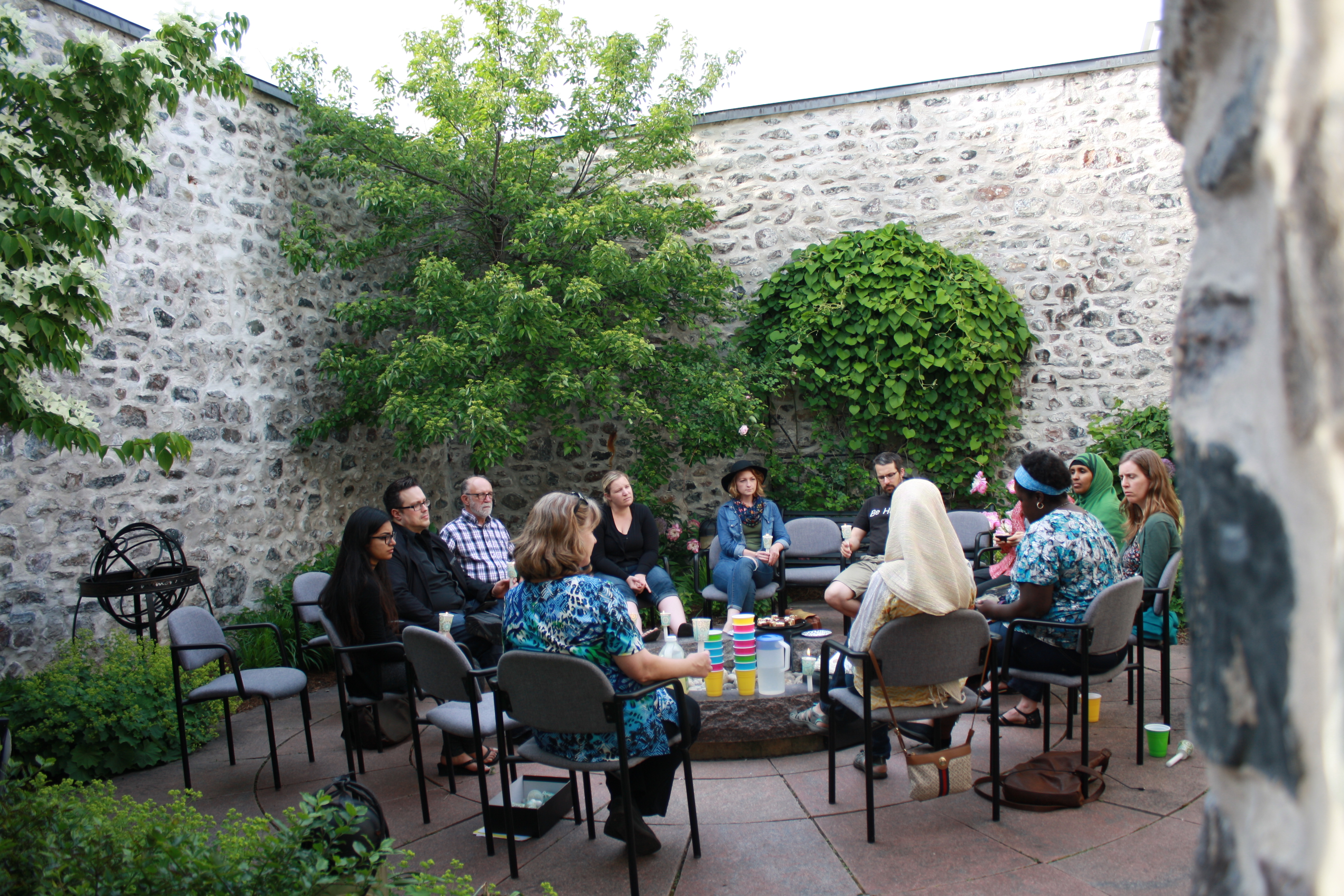 “I was moved to hear stories of racism and racial profiling of young men in our community. As a white woman with white children I will never need to worry about my children in this way. I cannot even begin to imagine how it must be for mothers to have these sorts of concerns for their children. These stories are important to hear. Ultimately it can be so easy to turn a blind eye, but we mustn’t.” (Caitlin Cull)
“I was moved to hear stories of racism and racial profiling of young men in our community. As a white woman with white children I will never need to worry about my children in this way. I cannot even begin to imagine how it must be for mothers to have these sorts of concerns for their children. These stories are important to hear. Ultimately it can be so easy to turn a blind eye, but we mustn’t.” (Caitlin Cull)
- Fanis Juma-Radstake shared the work of Young City Growers in engaging newcomer youth & harnessing their skills for community building. Fanis’s work to create safe and welcoming spaces has also continued through her role in facilitating a wider community dialogue about addressing racism.
- Sarah Shafiq is involved with Coalition of Muslim Women and Interfaith Grand River – watch for upcoming hate crime prevention initiatives.
- Sarah also worked with community partners to get the Anti-Racism Directorate to come to Waterloo Region this fall to collect local ideas on addressing systemic racism. Look for it on October 24, 2016.
What’s Your Role? Sexual Violence & Consent (June 23)
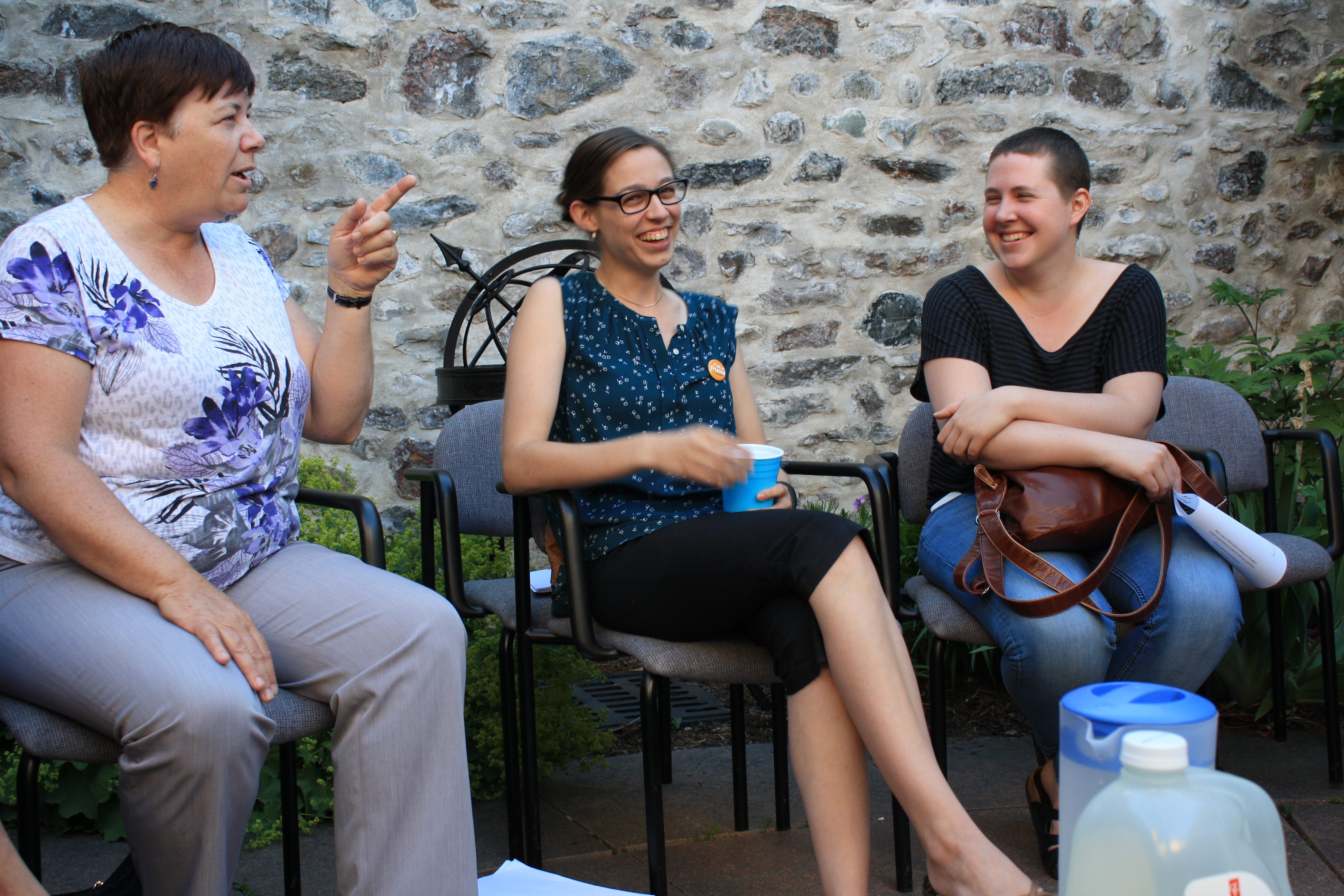 “The discussion on gender-based violence really highlighted the importance for me of making sure that we are addressing root causes and not treating symptoms. As a mother of sons I have a responsibility to raise children that are able to handle rejection and understand that others do not owe them anything. Working with young men is the first step to really addressing this problem.” (Caitlin Cull)
“The discussion on gender-based violence really highlighted the importance for me of making sure that we are addressing root causes and not treating symptoms. As a mother of sons I have a responsibility to raise children that are able to handle rejection and understand that others do not owe them anything. Working with young men is the first step to really addressing this problem.” (Caitlin Cull)
- Eleanor McGrath shared some of her research into youth’s knowledge of the legal definition of sexual consent. Recently she launched #ConsentED, an exhibit that transforms facts about consent and sexual assault into a vibrant, social-media friendly campaign. #ConsentED shows at the Laurier Campus library until December 21, 2016.
- Stephen Soucie told stories about Male Allies, a project of the Sexual Assault Support Centre. Over 100 men have been trained as Male Allies in Waterloo Region and thousands of other men and boys participate in Male Allies workshops each year.
- Joan Tuchlinsky talked about the need to call out micro-aggressions in everyday life. Speaking up when someone makes a racist or sexist comment helps creates a culture where hate-based and gender-based violence is not tolerated. The Sexual Assault Support Centre introduced a training program for all OHL teams about respect for women and consent. The Kitchener Rangers will pilot the training this fall.
Let’s keep the conversation going. Let us know about local initiatives that you are involved with that demonstrate further learning and action.
Posted on: February 28th, 2016 by Waterloo Region Crime Prevention Council
I attended the Truth & Reconciliation Forum hosted by White Owl Native Ancestry Association (WONAA), to learn about the Truth and Reconciliation Commission (TRC) recommendations.

There was a wealth of pre-session information shared each week prior to the event, allowing participants to understand more about the history and issues. I must admit, most of this was news to me, which is embarrassing. How did I not learn about this in school? It was a tough session hearing the horrific stories and pain we created for what? To now try and rectify, well, it feels almost impossible. But, this gave me more assurance that I made the right decision to participate in this educational opportunity.
The forum started with a traditional opening of smudging, drumming and singing, in a very connected manner. There were amazing guest speakers, all sharing their unique experiences, touching on one or more of the 94 TRC recommendations.
These recommendations were posted on sheets around the room grouped by category including Child Welfare, Education, Language & Culture, Health, Justice, Reconciliation & Equality, Youth Programs, Missing children & burial Information, Commemoration, Media & Reconciliation, Sports, Business and Newcomers. We were asked to write our email address onto as many of these that we would be interested in further action; so many possibilities to learn more.
The forum closed in a similar manner, respectful of aboriginal traditional practise.
10 Things I Learned about Truth & Reconciliation (What stuck in my mind)
- Change starts with me first.
- I can’t un-know what I now know.
- Knowing never stops; there are layers of learning.
- Healing takes time, at least 175 years (7 Generations principle).
- History is knowledge – it is important to understand in order to do reconciliation.
- The sharing circle approach (connection) is powerful in dealing with reconciliation.
- Reconciliation is personal, bringing one’s spirit to a place of peace.
- Reconciliation is planting the seed for relationship change.
- Conciliation is where we start to create something new, a 3rd space for all.
- There are 10,000-12,000 Aboriginals (First Nation, Inuit and Métis peoples) in Waterloo Region.
For more information, resources and progress, visit the WONAA site of Truth and Reconciliation – A Call to Action.
Community resources are available, “know before you need us”. White Owl Native Ancestry Association Community Resources.
I am grateful for having had the opportunity to participate in this powerful and informative forum. I will use this new understanding in positive ways, helping others to learn and understand too.
~Maureen Trask
Posted on: February 4th, 2016 by Waterloo Region Crime Prevention Council
Our new strategic plan – Smart on Crime 2015-2018 – is now available!
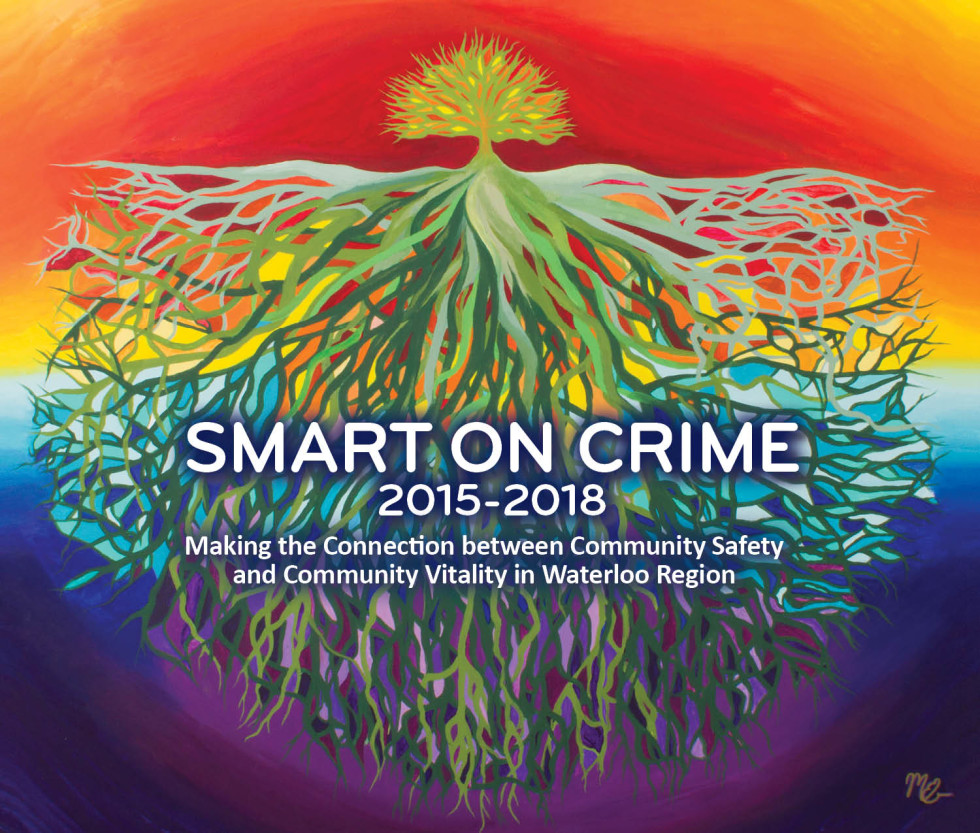
In 2015 we consulted with nearly 1,500 people in Waterloo Region, including the Friends of Crime Prevention, through telephone and online surveys and focus groups to help us navigate our road ahead. Thanks to all of you who participated.
What we heard was a resounding general understanding of root causes of crime. We are encouraged by the idea that the community understands why crime happens and how it can be prevented. This translates into many local actions that will contribute to community safety and vitality. The full data is captured in the report “Root Causes of Crime in Waterloo Region Consultation Report” available on our website.
Over the next four years, the Crime Prevention Council will focus its efforts in three key areas:
- Youth
- Neighbourhoods
- Building the momentum for Smart on Crime
We hope to do this work alongside our Friends of Crime Prevention and many other individuals and community partners.
Details of the plan are available online at www.smartoncrime.ca.
